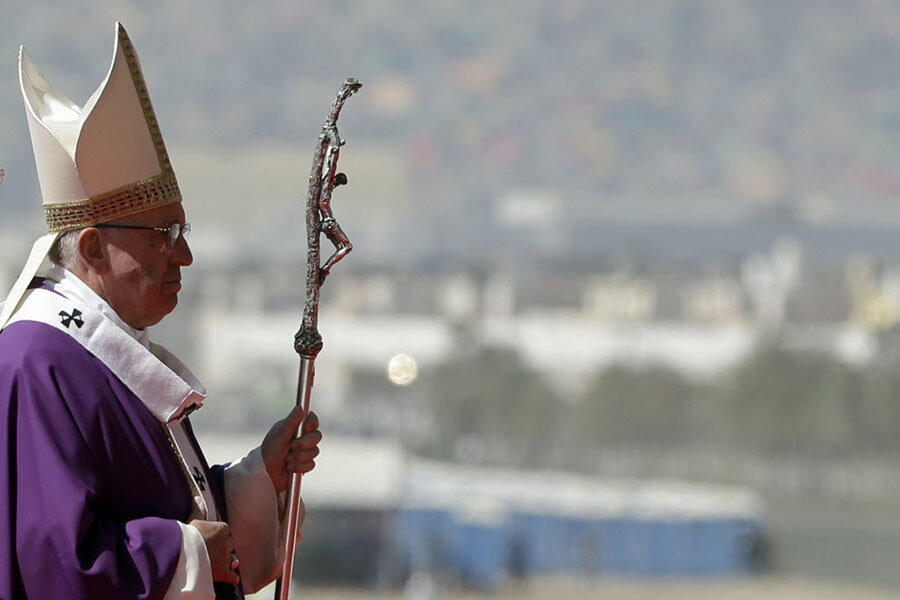Pope calls for peace in gang-striken Mexico City suburb
Loading...
Hundreds of thousands of people gathered Sunday for the biggest event of Pope Francis' five-day trip to Mexico, a Mass in the capital's crime-ridden suburb of Ecatepec, where drug violence, gangland-style executions and kidnappings are a daily fact of life. Francis had a clear message for the masses: "With the devil, there is no dialogue."
The Mexican bishops' conference said some 300,000 tickets had been handed out and that an estimated 2 million people were expected to line the pope's motorcade route to the huge field where the liturgy took place. They tossed flower petals as Francis passed by and cheered with pom-poms in the yellow and white colors of the Vatican flag.
Francis was bringing a message of encouragement to residents of an area where the murder rate, particularly of women, was so high that the government issued a special alert last year. With a densely packed population of some 1.6 million, Ecatepec is a sprawling carpet of cinderblock slums mixed in with some better-off neighborhoods, and is a strategic point for drug gangs that thrive amid poverty, unemployment and impunity.
In a clear reference to the drug lords who hold sway here, Francis focused his homily on the danger posed by the devil and urged Mexicans to resist the temptations of wealth and corruption.
"Let us get it into our heads: With the devil there is no dialogue," Francis said, improvising from his prepared text. "There can be no dialogue because he will always defeat us. Only the power of the word of God can defeat him."
As a morning chill turned to a brilliant, warm day, pilgrims on foot and clad in white lined the streets leading to the field. Vendors sold T-shirts, plates with Francis' image on them, pins, bandanas and cardboard-cutout figures of the pope.
"He's coming to Ecatepec because we need him here," said Ignacia Godinez, a 56-year-old homemaker. "Kidnappings, robberies and drugs have all increased, and he is bringing comfort. His message will reach those who need it so that people know we, the good people, outnumber the bad."
Francis' decision to celebrate his largest Mass in Ecatepec speaks volumes about his priorities and desire to go to the "peripheries" of Mexico. A day after he was feted in the grandeur of Mexico City's historic center, Francis began the part of the trip that is certainly closest to his heart: offering words of hope and encouragement to society's most marginalized.
At least 1,554 women have disappeared in Mexico State since 2005, according to the National Observatory on Femicide, and last year the government issued an alert over the killings of women in Ecatepec and 10 other parts of the state.
Nevertheless, women who came to see Francis said they felt safe, thanks in part to the huge security presence: The government assigned more than 10,000 police, soldiers and agents of the presidential guard to protect the pope's motorcade and Mass.
Graciela Elizalde, 35, arrived at the field Saturday evening to wait for the pope and said she wasn't at all afraid to spend the night on the street. She said she felt "protected by my faith and the joy of seeing the pope up-close."
"The pope is not going to change things, but at least he will touch the hearts of those who do harm and are trying to destroy the country," she said. "He is the 'messenger of peace' because that's exactly what Mexico needs, not just Ecatepec."
Conchita Tellez, 65, from the northwest Mexico border city of Mexicali, said she spent 38 hours on a bus to get to Ecatepec and was among the first in line for a spot at the Mass. She expressed hope Francis can help ease the troubled soul of the country, where 100,000 people have been killed and 27,000 disappeared in gangland violence since President Enrique Pena Nieto's predecessor launched an offensive against drug cartels shortly after taking office in late 2006.
"The pope comes to Mexico at a very ugly moment," Tellez said, "and he comes to pray for us and for all those who lost hope and have submerged the country in blood and violence."
Francis' is visiting Ecatepec a day after his grueling schedule appeared to be already taking a toll. He seemed tired and winded at times Saturday, and he appeared to nod off at an evening Mass and also lost his balance and fell into a chair set up for him to pray.
He appeared much livelier Sunday, beaming and waving at the crowds along his route.
The pope's five-day trip to the world's largest Spanish-speaking Catholic country is shining an uncomfortable spotlight on government and church shortcomings in dealing with social ills.
According to government statistics, about 46 percent of Mexicans live in poverty, including 10 percent in extreme poverty. Meanwhile, the homicide rate rose precipitously between 2006 and 2011, before declining somewhat for the next three years and then ticking up again in 2015.
Francis' schedule Sunday includes three popemobile motorcades and a visit to a pediatric hospital.
"The pope is coming to Ecatepec because it needs him and because the faith is reeling," said Petra Arqueta, a 62-year-old from Morelos who nonetheless spent a night waiting in line. "The poor and the working people are here, and this pope prefers to talk to the humble."







